Turkish Forces Bomb Kurdish Positions
The Turks have entered the conflict in Syria. Unfortunately for the United States, it's not on the side we would prefer.
The Turks have been sitting on the sidelines of the war in Syria for sometime now, but today they made a statement. Unfortunately for the United States, they did so by bombing Kurdish forces:
ISTANBUL — Turkish fighter jets struck Kurdish insurgent positions in southeastern Turkey on Monday, shaking the country’s fragile peace process with the Kurds and demonstrating the complexities surrounding the American-led coalition fighting the Islamic State, which Turkey is under heavy pressure to join.
Turkish news reports said the strikes had been aimed at fighters of the Kurdistan Worker’s Party, known as the P.K.K., and were in retaliation for the shelling of a Turkish military base.
Such airstrikes were once common, as Turkey fought a Kurdish insurgency in a conflict that claimed almost 40,000 lives over nearly three decades. But hostilities essentially ceased two years ago when the peace process began, and both the Turkish newspaper Daily Sabah and an online statement from the P.K.K. said the airstrikes on Monday were the first since then. The Turkish military also released a statement, but it did not mention airstrikes specifically, only an exchange of fire with “terrorists.”
The action is likely to reverberate far beyond Turkey’s borders, and raise further questions about Turkey’s willingness to take on what the United States and many experts say is a much greater enemy, one that should unite the Turks and the Kurds: the extremists of the Islamic State, also known asISIS or ISIL, who have taken control of large parts of Iraq and Syria.
In Syria, the Kurdish city Kobani, just over the border from Turkey, has been under siege by the Islamic State, prompting calls for intervention by the Turkish military, which has positioned troops nearby. Nearly 200,00 refugees have fled into Turkey from the city. The Turks, though, have been reluctant to step in militarily, because the fighters defending Kobani belong to an offshoot of the P.K.K.
The group, called the Democratic Union Party or P.Y.D., has carved out a measure of autonomy in some parts of northern Syria amid the chaos of the civil war there, and Turks see it as a security threat to Turkey.
Even before the airstrikes, Turkey’s unwillingness to do more to relieve Kobani, despite pressure from the United States and other countries, had spilled over into the streets of Turkish cities, where more than 30 people were killed last week in violence surrounding protests.
The Kurds have not sought Turkish military action in Kobani, but have pressed for Kurdish fighters to be allowed to pass through Turkish territory to join the fight in Syria. After the street protests, Kurdish leaders appealed for calm and for the continuation of the peace process, and tensions have eased for now.
Given the long standing conflict between Turkey and the P.K.K., it perhaps isn’t surprising that things have escalated yet again, especially given that the Turks are giving the perception that they are perfectly okay with sitting on the other side of the border watching Islamic State forces pound the Kurds in and around Kobani. Despite that, though, this is hardly going to make the process going forward any easier. As I’ve discussed before, the Turkish (and Kurdish) demand for a two-front war in Syria simply isn’t in American interests and would likely detract from the the mission that the President has set to “degrade and destroy” IS/ISIS. The other issue, of course is the fact that we have America’s most militarily powerful ally in the region, and a NATO ally at that, is seemingly doing everything it can to frustrate American plans. In addition to the inaction around Kobani, there’s also the ongoing disputes about whether the Turks would allow the U.S. to use bases in Turkey to launch attacks against IS/ISIS forces in Iraq and Syria. This dispute burst into the open over the weekend when both the Pentagon and, later, National Security Adviser Susan Rice in an appearance on Meet The Press, said that an agreement had been reached to allow American use of the basis to strike IS/ISIS. Yesterday, the Turkish government denied that any such agreement had been reached, a move which was obviously highly embarrassing to the American officials who had apparently believed that an agreement had been reached. In many ways, the difficulties the United States is having with Turkey now are reminiscent of the problems the Bush Administration had in getting permission to use Turkey as the launching pad for an attack on Iraq from the North by the 4th Infantry Division that would have come at the same time as the attack from the south that started the Gulf War. For an ally, Turkey has been quite uncooperative to say the least.
None of this bodes well for the President’s plan against IS/ISIS, of course. Such as it is, the international coalition is, by and large, the United States acting in concert with limited assistance from the French and the British, both of whom appear to only be engaging in activity in Iraq for the moment. The Arab nations that have pledged support, such as the UAE and Kuwait, have conducted some operations, apparently, but those have generally been in concert with American forces who ended up doing most of the work. The Turks getting involved, in the air or on the ground, or preferably both, would be a bigger addition to the mix even if it wouldn’t be a game changer. It would appear, however, that our ostensible ally has plans of its own that don’t involve cooperating with the United States.
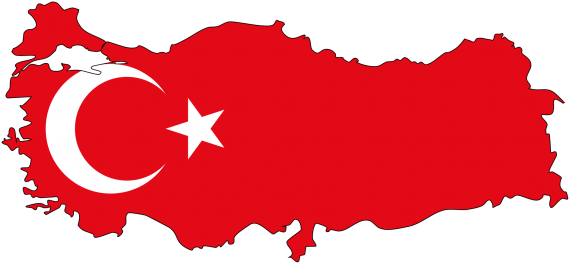

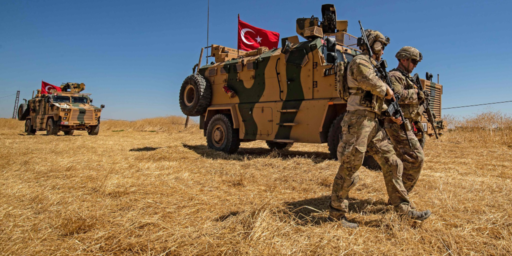
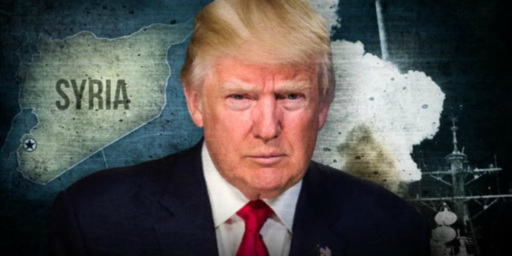
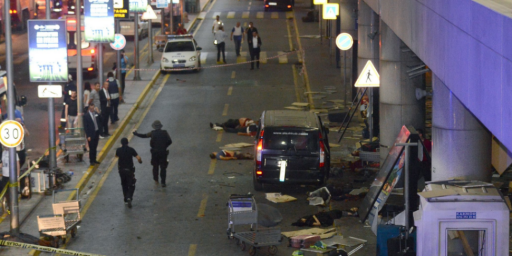
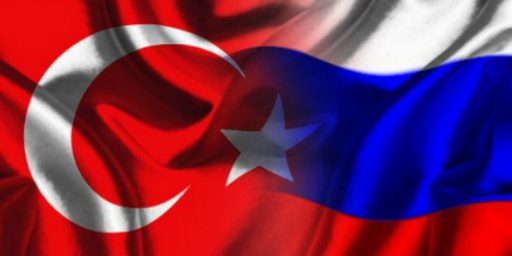
@michael reynolds:
Anything you’d like to say?
Turkey is barely an ally anymore. It’s a myth that they are a moderate Muslim country. they are led by a guy who wants to revive the Ottoman Empire and have also aided ISIS. There is an ISIS militant camp in Istanbul. Turkey also allows weapons to be transported into Syria through its borders and allows ISIS to sell its oil through Turkey
NATO at a minimum should move some bases and weapons out of Turkey to the Czech Republic. That would send a powerful message without NATO expulsion.
If Turkey throws in with ISIS, we are going to be in a world of hurt. We will have to get some heavy hitters in our lineup, including Germany and maybe even Iran.
@Tyrell:
They aren’t “throwing in” with ISIS. They are taking an opportunity to pound an ethnic group that has, for decades, been an insurgent group.
And there are no heavier hitters than us.
Iran is already fighting ISIS. They have “advisors” in the Iraqi army that are working side by side (literally-physically) with our “advisors.”
Sigh. Thomas Hobbes coined the term “Bellum omnium contra omnes“(War of all against all). That describes the Middle East about now. The closest historical analogy I can think of : the Thirty Years’ War. The bad part about that: that conflict lasts thirty years. We are in Year 4.
The worst part: it wrecks Europe and reshuffles it into a whole new formation. That means we can’t predict what the ME will look like when it’s done.
Doug of course thinks we can ignore all this, but the reshuffling is eventually going to involve who controls oil, and I’m pretty sure Doug’s car doesn’t run on fairy dust…
@stonetools:
I am not saying we should ignore it. I am saying that there is little we can do to actively control it, and that direct American military involvement is not likely to solve the problems the White House is talking about and is likely to create entirely new problems.
@stonetools: The Thirty Years’ War wasn’t a continuous high-level conflict. It had its peaks and valleys, stretches that were “merely” humanitarian crises rather than field battles. If you look at it that way, this current war began as the Soviet invasion of Afghanistan and/or the Iranian Revolution and subsequent Iran-Iraq War. Granted, the area has seen instability for decades and centuries earlier, but there’s been a constant state of crisis since the late 1970’s.
Three cheers for Smart Diplomacy by the Nobel Peace Prize laureate.
@Doug Mataconis:
And you think diplomacy alone will do better than diplomacy and military engagement? To be honest, I completely understand why you want to stay out of the Middle East mess. I think Obama wanted to as well. But hey, you can’t ignore OIL!
@Pinky:
Heck, you could argue that the wheels starting coming off the cart when Britain and France dismantled the Ottoman Empire after World War One, lied and made contradictory promises to everyone, and created the current dysfunctional Middle East. Now it’s finally coming apart, I guess. FSM knows what it’s going to look like in ten years, much less thirty.
I wonder how many times Turkey will be able to pull these hijinks before they’re ejected from NATO.
Tell me again why we have to get involved here? Tell me again how our involvement will result in fairy dust and unicorns? Tell me again how it is we can not buy oil on the world market where these particularly nasty jerkoffs will have to sell it?
Really, If the Chinese feel no need to invest billions of defense Yuans, why are we incapable of seeing the same path to energy?
Interesting to see the oil card being played when the US has become the world’s largest producer of oil and gas according to those who should know.
Then there’s the problem that the State Department has named the PKK/PYD to the Foreign Terrorist Organization list and in the past, been supportive when the Turks went after them in Iraq.
Another problem is the the powder key around the Black Sea which Turkey borders and provides a handy base for US intelligence gathering, etc.
So, the best result would be for PKK/PYD and Daesh to kill each other much like Richelieu wanted the warring Germans to do. However, the game plan appears to be out of the Duty to Protect Playbook which can be long, messy and bloody.
@Stormy Dragon:
I was on book tour in the UK and on a plane when you posted this.
Look, all the way through the Obamacare debate and after it was past, I said the same thing: It’ll all come out in the wash and the niggly details don’t matter because the essential thing is that it’s now a federal issue. Mataconis and Joyner and Schuler spent two years obsessing over every little problem. And now? Well, now Obamacare is working exact;y as Mr. Obama said it would. And Mataconis and Joyner and Schuler have suddenly lost interest in Obamacare. Not a word that I’ve seen acknowledging that they were wrong.
So I see how the game is played now. Panic, panic, criticize, criticize, jump on every seeming setback, and then when it comes out just how I said it would, people like you will suddenly disappear and refuse to talk about it.
Has ISIS taken Kobani yet? No. Have they made any significant advance lately? No. Does the coalition include 60 countries, and are they actively participating, and is Israel strangely silent which would indicate their acknowledgment that we’re doing the right thing from their POV? Yes. Were we not terrified of ISIS precisely because we were convinced they were the Wehrmacht in mid-blitzkrieg? Yes. Are they? Um, no.
So again, I’ll end up being right, and all of you will pretend this back-and-forth never happened. I’m used to the lack of honesty and accountability now.The GOP will cash in their fear-and-panic chips and win the mid-terms. And then Obama will be right again and you’ll all refuse to acknowledge how wrong you were.
Rinse and repeat.
@michael reynolds:
Wow, it’s like he’s been replaced by Dick Cheney.
One thing that jumps out to me here is that, while obviously bombing PKK positions affects Syria insofar as this is the same group defending Kobane, these strikes happened on the border with Iran, and even if it was, attacking PKK isn’t going to be see as siding with ISIS anymore than attacking ISIS is going to be seen as siding with Assad (although, geopolitical chess match aside, that is what we would/should be doing).
@Dave Schuler:
As long as they are more valuable in than out and as long as Russia would happily replace us as a close ally.
@Grewgills:
Okay, I’ll bite. What is Turkey’s value in?
@Dave Schuler:
Fig Leaf. If someone accuses us of brutalizing muslims, we can point to Turkey and go “See, they’re an islamic country and they’re helping us!”
@Dave Schuler:
Geography
Incidentally, the tide has turned in Kobani. I’ll give you a conspiratorial explanation: the Turks are offering more assistance. The bombing of Kurds a few days ago was cover, deniability. I’ll bet you weapons and Kurdish volunteers are getting through, and Turkey has maintained its strong anti -Kurdish independence stance. No idea if this is true, but it would be appropriately Byzantine.
http://www.bbc.com/news/world-middle-east-29629357